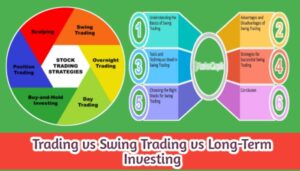Investing in stocks has long been one of the most effective ways to grow wealth over time. While many investors focus on domestic stocks, international or global stocks offer unique opportunities and challenges that can diversify a portfolio and potentially increase returns. This article explores everything you need to know about international stocks, including their benefits, risks, strategies, and key considerations.
1. What Are International / Global Stocks?
International or global stocks refer to the shares of companies that are listed on stock exchanges outside an investor’s home country. For example, an investor in India buying shares of Apple or Nestlé is investing in international stocks. These stocks represent ownership in foreign companies and allow investors to participate in the growth of economies and markets beyond their own.
Investing in international stocks can be done in several ways, such as:
- Direct Purchase: Buying shares on foreign stock exchanges through brokerage accounts that support international trading.
- American Depository Receipts (ADRs): U.S.-listed securities representing shares in foreign companies.
- Mutual Funds / ETFs: Pooled funds that invest specifically in global equities.
2. Features of International Stocks
International stocks differ from domestic stocks in several ways. Below is a summary:
| Feature | Description |
|---|---|
| Market Listing | Listed on foreign exchanges like London Stock Exchange, Tokyo Stock Exchange, or Hong Kong Stock Exchange. |
| Currency Exposure | Investment returns are influenced by exchange rate fluctuations. |
| Diversification | Helps spread investment risk across different economies and industries. |
| Regulations | Subject to the foreign country’s legal and regulatory environment. |
| Taxation | Tax treatment may differ based on treaties and local laws. |
| Access to Growth | Enables participation in fast-growing or emerging markets. |
3. Why Invest in International Stocks?
Investing internationally offers several advantages:
1. Diversification of Portfolio
By investing in multiple countries, investors reduce dependence on the economic performance of their home country. For example, if the U.S. market experiences a downturn, gains from Asian or European stocks may offset losses.
2. Access to Global Growth Opportunities
Some of the fastest-growing companies are located outside your home country. Emerging markets like India, China, and Brazil offer growth potential due to rising middle-class populations and rapid industrialization.
3. Hedging Against Domestic Risk
Economic, political, or currency fluctuations in your home country can affect your investments. International stocks provide a hedge against these risks.
4. Exposure to Different Industries
Certain industries or sectors may dominate specific regions. For instance, tech giants like Samsung and Alibaba are based in South Korea and China, giving investors exposure to technological advancements abroad.
4. Risks of Investing in International Stocks
While international stocks have their advantages, they also come with specific risks:
1. Currency Risk
Changes in foreign exchange rates can significantly impact returns. For example, if an investor buys European stocks in euros and the euro weakens against their home currency, the investment loses value even if the stock price rises.
2. Political and Economic Risk
Foreign countries may face political instability, changes in taxation, or economic crises that can affect stock performance.
3. Regulatory Risk
Different countries have varying regulations, reporting standards, and disclosure requirements, making it difficult to fully evaluate foreign companies.
4. Liquidity Risk
Some foreign markets may have lower trading volumes, making it harder to buy or sell shares quickly at desired prices.
5. Cultural and Market Knowledge
Investors may lack in-depth knowledge of foreign markets, corporate governance standards, and business practices, which can lead to poor investment decisions.
5. Strategies for Investing in International Stocks
Investors can adopt multiple strategies based on risk tolerance, investment goals, and market knowledge.
1. Direct Investment in Foreign Stocks
For sophisticated investors with access to international brokerages, directly buying shares on foreign exchanges allows complete ownership and voting rights in the company.
2. Investing Through ADRs / GDRs
ADRs (American Depository Receipts) and GDRs (Global Depository Receipts) are certificates representing foreign shares traded on U.S. or global exchanges. They are convenient, more regulated, and reduce currency complications.
3. International Mutual Funds / ETFs
These funds pool investors’ money to buy a diversified basket of international stocks. ETFs provide flexibility, lower fees, and liquidity compared to direct investments.
4. Regional Focus
Investors can focus on specific regions like Asia-Pacific, Europe, or emerging markets to exploit local growth trends.
5. Sector-Based International Investment
Targeting specific industries globally, such as technology, healthcare, or energy, can yield higher returns if the sector performs well internationally.
6. Taxation Considerations
Investing in international stocks comes with complex tax implications:
- Dividend Tax: Foreign companies may withhold a portion of dividends as tax before it reaches you. Tax treaties between countries can reduce this rate.
- Capital Gains Tax: Selling international stocks may incur capital gains tax in both the foreign country and your home country.
- Currency Conversion Costs: Exchanging foreign dividends or proceeds to your home currency may incur fees.
Understanding local and international tax laws is essential to maximize after-tax returns.
7. Role of Currency in International Stocks
Currency movements can either enhance or reduce returns on international stocks. For example:
- Appreciating Foreign Currency: If the foreign currency strengthens against your home currency, your returns increase.
- Depreciating Foreign Currency: If the foreign currency weakens, your returns decrease.
Investors can hedge currency risk using financial instruments like futures, options, or ETFs that mitigate currency exposure.
8. How to Research International Stocks
When considering international investments, thorough research is crucial:
- Understand the Country’s Economy: GDP growth, inflation, and unemployment trends indicate potential growth.
- Political Stability: Stable governments reduce risk for long-term investments.
- Company Fundamentals: Examine revenue growth, profit margins, debt levels, and market share.
- Industry Trends: Certain industries thrive in specific countries due to local demand or government support.
- Currency Outlook: Consider expected currency movements relative to your home currency.
9. Benefits of Investing in International Stocks
- Enhanced Diversification: Reduces portfolio volatility.
- Higher Growth Potential: Emerging markets often grow faster than developed markets.
- Access to Global Leaders: Invest in companies not available domestically.
- Inflation Hedge: Certain international markets may protect against domestic inflation.
10. Challenges to Keep in Mind
- Increased complexity in portfolio management.
- Potential for higher costs and fees.
- Greater need for monitoring global economic trends.
- Exposure to geopolitical tensions and trade restrictions.
11. Tips for Beginner Investors
- Start Small: Begin with ETFs or mutual funds to reduce risk.
- Diversify Geographically: Spread investments across developed and emerging markets.
- Monitor Currency Risks: Consider hedged international funds if currency volatility concerns you.
- Use Reputable Brokers: Choose brokers that offer international trading and transparent fees.
- Stay Updated: Follow global economic news and market trends.
12. Conclusion
Investing in international or global stocks can be a powerful strategy for building wealth, diversifying your portfolio, and accessing high-growth opportunities beyond your home country. While they carry additional risks like currency fluctuations, political instability, and regulatory differences, careful research, diversification, and strategic planning can help investors navigate these challenges successfully.
By understanding the dynamics of global markets, leveraging financial instruments like ETFs and ADRs, and keeping an eye on economic and political factors, investors can enhance their portfolios and benefit from the growth of companies worldwide.
International investing is not just about financial returns—it’s also about connecting to the broader global economy and participating in opportunities that go beyond borders.

















